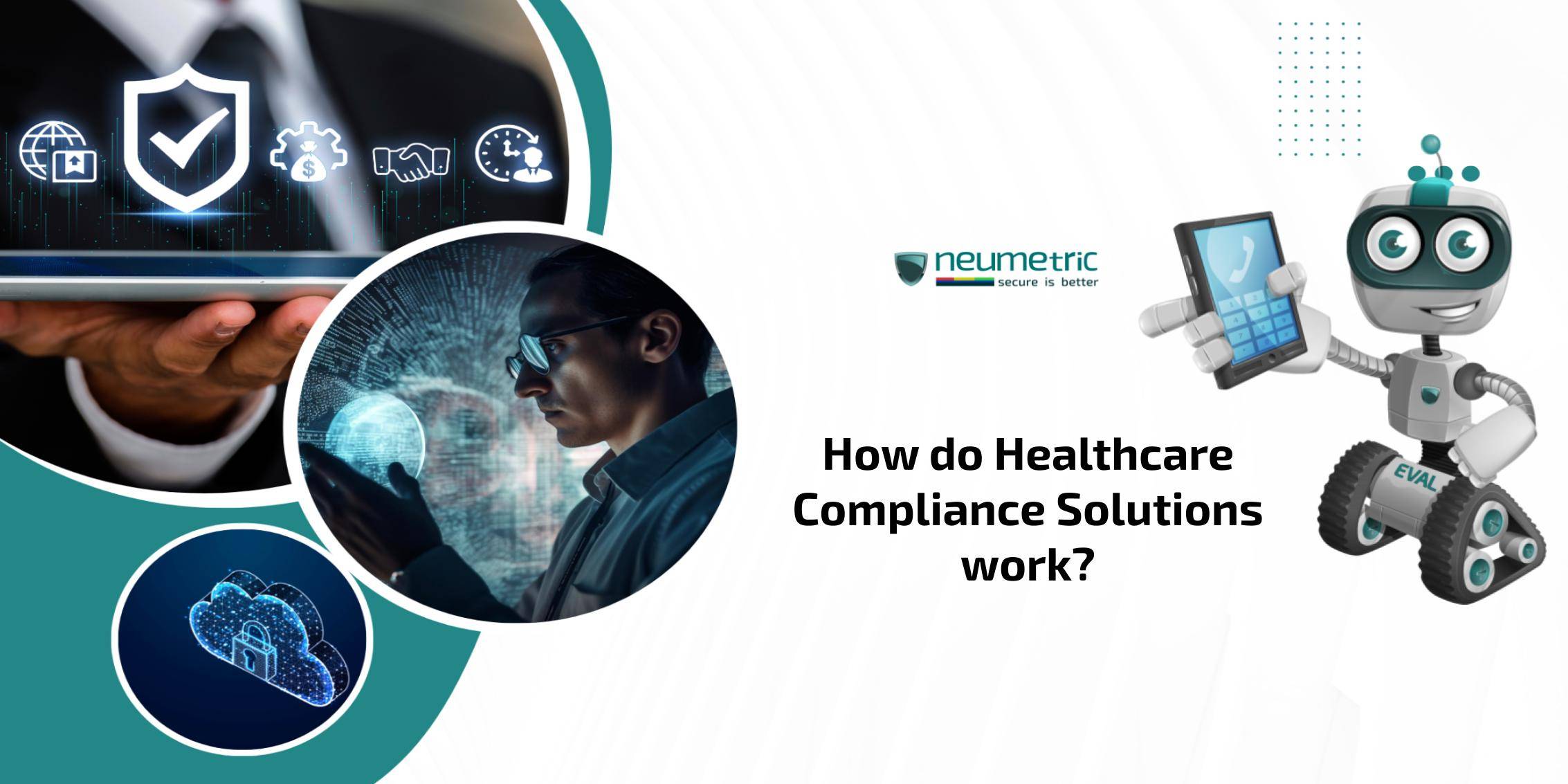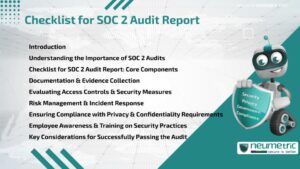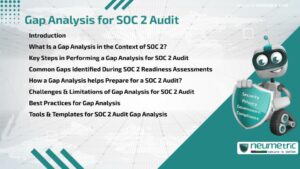Table of Contents
ToggleHow do Healthcare Compliance Solutions work?
Introduction
In the ever-evolving landscape of healthcare, adherence to regulatory standards is paramount. Healthcare compliance ensures that medical practices, institutions & professionals operate within the legal framework, safeguarding patient well-being and maintaining the integrity of the industry. Compliance serves as a cornerstone for trust, assuring patients that their sensitive information is handled securely and ethically.
Healthcare compliance solutions are comprehensive frameworks designed to navigate the complex web of regulations governing the industry. These solutions encompass a range of tools and practices aimed at ensuring that healthcare entities meet and exceed the standards set by regulatory bodies. From safeguarding Electronic Health Records [EHR] to implementing robust compliance management software, these solutions play a crucial role in fostering a culture of accountability and transparency within the healthcare ecosystem. As we delve deeper into the intricacies of healthcare compliance, it becomes evident that these solutions are not just safeguards against legal repercussions but are vital contributors to maintaining the highest standards of patient care.
Understanding Healthcare Compliance
Healthcare compliance refers to the adherence to laws, regulations & standards governing the healthcare industry. Its significance lies in ensuring that healthcare providers and organizations operate ethically, maintain patient confidentiality & deliver quality care. By following established guidelines, healthcare compliance safeguards patient trust, protects sensitive health information & upholds the reputation of the industry. It is a proactive approach to mitigate risks, promote transparency & enhance overall patient outcomes.
Regulatory Bodies and Standards
The landscape of healthcare compliance is shaped by various regulatory bodies and standards, each contributing to the overall framework that governs the industry. Entities such as the Health Insurance Portability and Accountability Act [HIPAA], the Centers for Medicare & Medicaid Services [CMS] & the Food and Drug Administration [FDA] set forth regulations that address data security, billing practices & product safety, respectively.
Adherence to these standards not only ensures legal compliance but also fosters a culture of continuous improvement in healthcare delivery. Understanding the role of these regulatory bodies is fundamental to appreciating the nuanced nature of healthcare compliance and the need for robust solutions in this dynamic sector.
Components of Healthcare Compliance Solutions
Electronic Health Records [EHR] Security
Electronic Health Records [EHR] form the backbone of modern healthcare, centralizing patient information for efficient and coordinated care. The security of these records is a critical component of healthcare compliance solutions. Robust EHR security involves the implementation of encryption protocols (such as encryption of data-at-rest and data-in-transit using algorithms such as AES 256-bit or RSA 2048), secure data transmission methods & stringent access controls (using methods such as Role-based Access Controls). By safeguarding the confidentiality and integrity of patient data, healthcare providers ensure compliance with privacy regulations and build trust among patients who rely on the healthcare system to protect their sensitive information.
Compliance Management Softwares
Compliance Management Software (such as Fusion) is a proactive tool designed to streamline the complex task of adhering to ever-changing regulatory requirements. This component of healthcare compliance solutions offers functionalities such as tracking and managing regulatory changes, automating compliance reporting & providing a centralized platform for monitoring adherence. By leveraging technology, organizations can enhance their ability to stay updated on regulatory nuances, reducing the risk of non-compliance. This software serves as a strategic asset, allowing healthcare entities to navigate the intricate regulatory landscape efficiently.
Training and Education Programs
The human factor in healthcare is pivotal to compliance. Training and education programs are essential components of healthcare compliance solutions, ensuring that staff members are well-versed in the latest regulations and best practices. These programs cover a range of topics, including data security, ethical conduct & evolving compliance requirements. Continuous training not only keeps healthcare professionals informed but also instills a culture of compliance within the organization. By investing in the knowledge and skills of their workforce, healthcare entities strengthen their overall compliance posture and contribute to the delivery of high-quality, lawful patient care.
Role of Artificial Intelligence [AI]
AI-Driven Risk Assessments
Artificial Intelligence [AI] has emerged as a transformative force in healthcare compliance solutions, particularly in the realm of risk management. AI-driven risk assessments utilize advanced algorithms to analyze vast datasets, identify patterns & predict potential compliance issues. By proactively assessing risks, healthcare organizations can preemptively address areas of concern, reducing the likelihood of regulatory breaches. This not only enhances compliance but also contributes to a more resilient and adaptive approach to the ever-evolving healthcare regulatory landscape.
Automation of Compliance Tasks
Automation is a key facet of healthcare compliance solutions, streamlining routine tasks and reducing the margin for error. AI-driven automation in compliance tasks involves the use of intelligent algorithms to perform activities such as data validation, documentation & reporting. By automating repetitive processes, healthcare entities can allocate resources more efficiently and ensure consistent adherence to regulations. This not only enhances operational efficiency but also minimizes the risk of human error, contributing to a more robust and reliable healthcare compliance framework. As technology continues to advance, the role of AI in automating compliance tasks is poised to become increasingly integral to the overall success of healthcare organizations.
Benefits of Healthcare Compliance Solutions
Improved Data Security
One of the primary benefits of healthcare compliance solutions is the enhancement of data security. By implementing robust measures such as encryption, secure access controls & regular risk assessments, organizations fortify the protection of sensitive patient information. This not only ensures compliance with privacy regulations but also instills confidence in patients, who trust that their health data is handled with the utmost care. Improved data security is not just a regulatory requirement but a fundamental aspect of maintaining the integrity and reputation of healthcare institutions.
Streamlined Regulatory Adherence
Healthcare compliance solutions play a pivotal role in streamlining regulatory adherence, offering organizations a systematic approach to navigating the intricate landscape of healthcare regulations. Compliance management software, coupled with regular training programs, helps healthcare entities stay abreast of regulatory changes and ensures that policies and practices align with evolving standards. This proactive approach minimizes the risk of non-compliance, legal repercussions & reputational damage. Streamlined regulatory adherence is not only a compliance imperative but also a strategic advantage in the competitive and highly regulated healthcare industry.
Cost Savings Through Automation
Automation of compliance tasks brings about significant cost savings for healthcare organizations. By leveraging technology to handle routine and repetitive processes, such as data validation and documentation, entities can allocate human resources more strategically. This not only reduces the likelihood of errors but also enhances operational efficiency. The financial benefits extend beyond mere cost savings, as automation allows healthcare professionals to focus on core responsibilities, ultimately improving the overall quality of patient care. Through a combination of improved efficiency and reduced operational costs, healthcare compliance solutions contribute to the sustainable and effective management of healthcare services.
Challenges and Considerations
Keeping up with Evolving Regulations
One of the foremost challenges in healthcare compliance is the dynamic nature of regulations. The healthcare landscape is marked by frequent changes in laws and standards, making it challenging for organizations to stay current. Healthcare compliance solutions must be agile and adaptable, capable of swiftly incorporating updates and ensuring that all practices align with the latest regulatory requirements. This challenge necessitates a proactive approach, with organizations investing in continuous education, monitoring regulatory changes & leveraging technology to stay ahead in the ever-evolving compliance landscape.
Integration with Existing Systems
Integrating healthcare compliance solutions seamlessly with existing systems poses another significant challenge. Many healthcare organizations operate with complex infrastructures, including electronic health record [EHR] systems, billing platforms & other specialized software. Ensuring the compatibility and smooth integration of compliance solutions into these existing frameworks requires careful planning and consideration. Challenges may arise in terms of data migration, system interoperability & potential disruptions during the implementation phase. Successful integration is essential to harness the full potential of healthcare compliance solutions without compromising the overall functionality of existing systems.
Balancing Compliance with Efficiency
Achieving a delicate balance between compliance and operational efficiency is an ongoing consideration in the healthcare sector. While robust compliance measures are imperative, overly burdensome processes can hinder the efficiency of healthcare delivery. Striking the right balance involves implementing streamlined workflows, optimizing compliance-related tasks through automation & ensuring that adherence to regulations does not impede the timely provision of patient care. This challenge underscores the need for healthcare organizations to adopt solutions that enhance both compliance and operational efficiency, thereby fostering a healthcare environment that is not only legally sound but also responsive and effective.
Conclusion
In conclusion, healthcare compliance solutions stand as indispensable pillars in ensuring the integrity, security & efficiency of the healthcare industry. The benefits derived from improved data security, streamlined regulatory adherence & cost savings through automation underscore the significance of these solutions. However, challenges such as staying abreast of evolving regulations, integrating with existing systems & balancing compliance with efficiency require constant attention.
As the healthcare landscape continues to evolve, the continuous need for robust healthcare compliance solutions remains evident. Organizations must embrace these challenges as opportunities for improvement, fostering a culture of compliance that not only meets regulatory standards but also contributes to the overall advancement of healthcare practices.
Frequently Asked Questions [FAQ]
Why is data security highlighted as a key benefit of healthcare compliance solutions?
Healthcare compliance solutions prioritize data security through encryption, secure access controls & regular risk assessments. This not only ensures adherence to privacy regulations but also builds trust by handling sensitive health data with the utmost care.
How do healthcare compliance solutions address the challenge of staying current with evolving regulations?
Solutions proactively tackle the challenge of evolving regulations through continuous education, real-time monitoring & leveraging technology. This ensures that healthcare organizations remain agile, swiftly incorporating updates and aligning practices with the latest regulatory requirements.
What steps can healthcare organizations take to balance compliance with efficiency and integrate solutions with existing systems?
Achieving a balance between compliance and efficiency involves optimizing workflows, automating compliance tasks & carefully planning the integration of solutions with existing systems. This strategic approach ensures that adherence to regulations enhances rather than hinders the timely provision of patient care.





